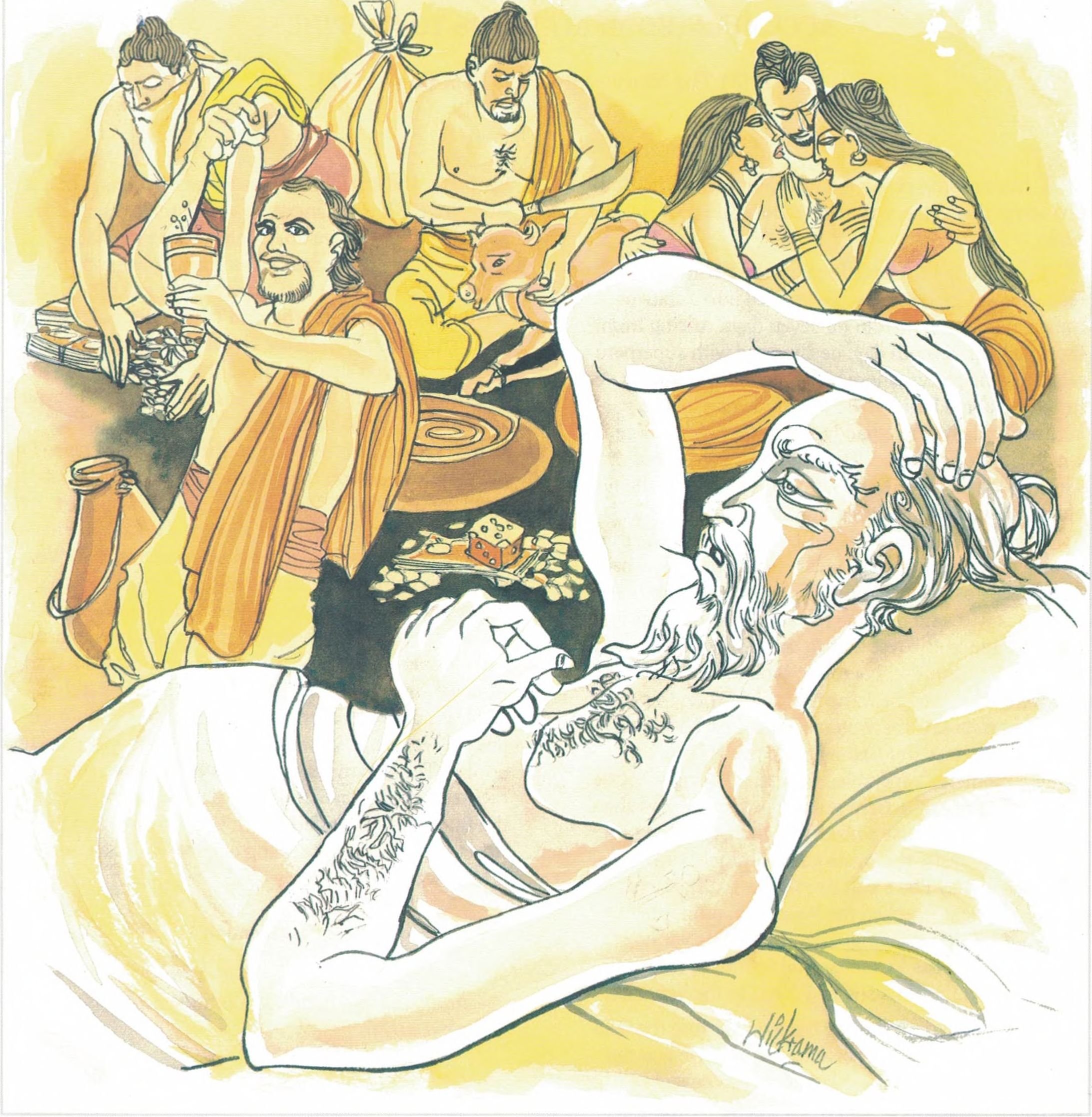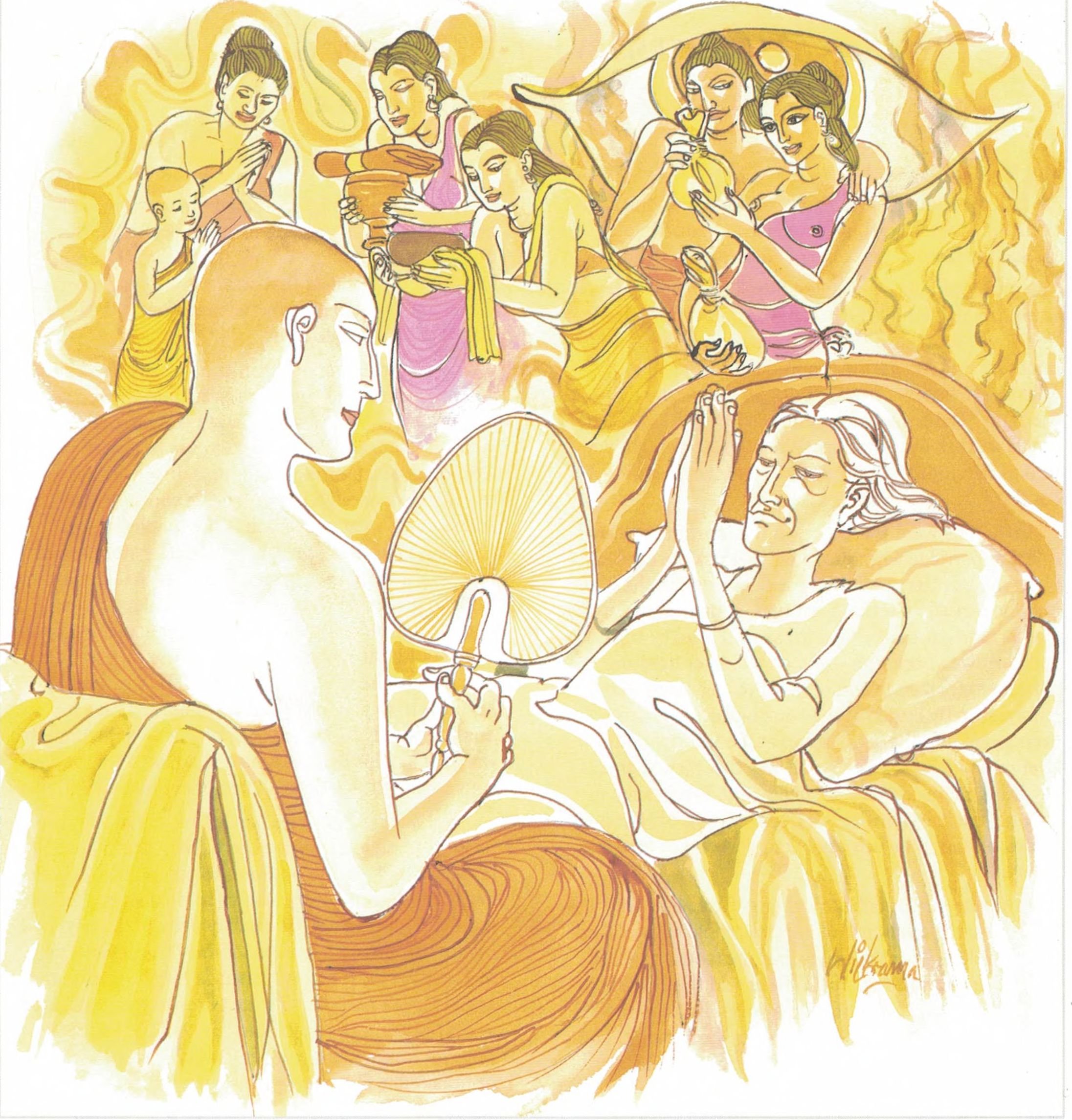Dhammapada (Illustrated)
by Ven. Weagoda Sarada Maha Thero | 1993 | 341,201 words | ISBN-10: 9810049382 | ISBN-13: 9789810049386
This page describes The Story of Anathapindika which is verse 119-120 of the English translation of the Dhammapada which forms a part of the Sutta Pitaka of the Buddhist canon of literature. Presenting the fundamental basics of the Buddhist way of life, the Dhammapada is a collection of 423 stanzas. This verse 119-120 is part of the Pāpa Vagga (Evil) and the moral of the story is “Even evil is seen as goodness before it ripens. But when it ripens its evil is seen” (first part only).
Verse 119-120 - The Story of Anāthapiṇḍika
Pali text, illustration and English translation of Dhammapada verse 119-120:
pāpo'pi passati bhadraṃ yāva pāpaṃ na paccati |
yadā ca paccati pāpaṃ atha pāpo pāpāni passati || 119 ||
bhadro'pi passati pāpaṃ yāva bhadraṃ na paccati |
yadā ca paccati bhadraṃ atha bhadro bhadrāni passati || 120 ||
119. As long as evil ripens not even the evil one goodness knows, but when the evil ripens then that person evil knows.
120. As long as goodness ripens not even the good one evil knows, but when the goodness ripens then that person knows the good.
 Even evil is seen as goodness before it ripens. But when it ripens its evil is seen. |
 The doer of acts of goodness appreciates his own only when good results begin to appear. |
The Story of Anāthapiṇḍika
While residing at the Jetavana Monastery, the Buddha spoke these verses, with reference to Anāthapiṇḍika, the famous rich man of Sāvatthi.
Anāthapiṇḍika, who spent fifty-four billion of treasure in the religion of the Buddha on Jetavana Monastery alone, proceeded in state three times a day to wait upon the Buddha during the Buddha’s residence at Jetavana. Whenever he set out to go thither, he thought, “The probationers and novices will look at my hands and ask the question, ‘What has he brought with him as offerings?’” and therefore never went empty-handed.
When he went there early in the morning he carried rice-porridge with him; after breakfast he carried ghee, fresh butter, and other medicaments; in the evening he carried with him perfumes, garlands, unguents, and garments. Now those who lived by trade had borrowed from him eighteen billion of treasure. Moreover eighteen billion of treasure belonging to his family, secretly buried at the bank of the river, had been swept into the great ocean at the time when the river burst its banks. The result was that he was gradually being reduced to a state of poverty. But in spite of this, he just gave alms to the Congregation of Monks as before, although he was unable to give choice food as before.
One day the Buddha asked him, “Are alms provided for us in the house of our householder?” Anāthapiṇḍika replied, “Yes, Venerable, but the food is nothing but bird-feed and sour gruel.” Then said the Buddha to him, “Householder, do not allow yourself to think, ‘It is nothing but coarse food that I give to the Buddha,’ and be not disturbed thereat. If the intention be pure, it is impossible to give the Buddhas and others food that is really coarse.”
When the Buddha and the Buddha’s disciples entered the house of Anāthapiṇḍika, the goddess who dwelt over the gate, unable to remain, by reason of the intensity of their goodness, thought to herself, “I will detach the householder from his allegiance, that they may no more enter this house.” Now although the goddess had longed to address the householder, she could not say a word to him in the heyday of his wealth and power. At this time, however, she thought to herself, “The householder is now a poor man, and will therefore be disposed to give heed to my words.” Accordingly she went by night, entered the treasurer’s chamber of state, and stood poised in the air. When the treasurer saw her, he said, “Who is that?” “It is I, great treasurer, the goddess that resides over your fourth gate. I am come to give you admonition.” “Well then, say what you have to say.”
“Great treasurer, without considering the future, you have dissipated your great wealth in the religion of the monk Gotama. Now, although you have reduced yourself to poverty, you still continue to give of your wealth. If you continue this course, in a few days you will not have enough left to provide you with clothing and food. Of what use to you is the monk Gotama? Abandon your lavish giving, devote your attention to business, and make a fortune.” “Is this the advice you came to give me?” “Yes, treasurer.” “Then go away. Though a hundred thousand like you should try, you would not be able to move me from my course. You have said to me what you had no right to say; what business have you to dwell in my house? Leave my house instantly.” The goddess, unable to withstand the words of a noble disciple who had attained the fruit of conversion, left his house, taking her children with her.
But after the goddess had left his house, she was unable to find lodging elsewhere. Then she thought to herself, “I will ask the treasurer to pardon me and to allow me to resume my residence in this house.” Accordingly she approached the tutelary deity of the city, told him of her offense, and said to him, “Come now, conduct me to the treasurer, persuade him to pardon me, and persuade him to allow me to resume my residence in his house.” But the tutelary deity of the city replied, “You said something you had no business to say; it will be impossible for me to go with you to the treasurer’s residence.” Thus did the tutelary deity of the city refuse her request. Then she went to the Four Great Kings, but they likewise refused her request. Then she approached Sakka king of gods, told him her story, and entreated him yet more earnestly. Said she, “Sire, I am unable to find a place wherein to lodge myself, but wander about without protection, children in hand. Obtain for me the privilege of returning to my former residence.” Sakka replied, “But neither will it be possible for me to speak to the treasurer in your behalf. However, I will tell you a way.” “Very good, sire; tell me what it is.”
“Go, assume the dress of the treasurer’s steward; note on a leaf from the hand of the treasurer a list of the wealth he once possessed; put forth your supernatural power and recover the eighteen billion of wealth borrowed by those who live by trade, and fill therewith the treasurer’s empty storeroom. Besides this wealth, there are eighteen billion of wealth which were swept into the great ocean. Yet again there are eighteen billion of wealth without an owner, to be found in such and such a place.
Gather all this together and therewith fill his empty storeroom. Having thus atoned for your offence, ask him to grant you pardon.” “Very well,” said the goddess. And straightaway she did all, just as Sakka king of gods told her to. Having so done, she went and stood poised in the air, illuminating with supernatural radiance the treasurer’s chamber of state.
“Who is that?” asked the treasurer. “It is I,” replied the goddess, “the blind, stupid goddess that once dwelt over your fourth gate. Pardon me the words I once spoke to you in my blind stupidity. In obedience to the command of Sakka king of gods, I have recovered the fifty-four billion of wealth and filled your empty storeroom therewith; thus have I atoned for my offence; I have no place wherein to lodge myself, and therefore am I greatly wearied.” Anāthapiṇḍika thought to himself, “This goddess says to me, ‘I have made atonement for my offence,’ and confesses her fault; I will conduct her to the Supremely Enlightened.” Accordingly he conducted her to the Buddha, saying to her, “Tell the Buddha all you have done.” The goddess fell upon her face before the feet of the Buddha and said, “Venerable, because of my folly I did not recognize your eminent merit and spoke evil words; pardon me for having spoken them.” Thus did the goddess ask pardon of both the Buddha and of the great treasurer.
Then the Buddha admonished both the treasurer and the fairy with reference to the ripening of deeds both good and evil, saying, “Here in this present life, great treasurer, even an evildoer sees happiness, so long as his evil deed has not yet ripened. But so soon as his evil deed has ripened, then he sees only evil. Likewise a good man sees evil things, so long as his good deeds have not yet ripened; but so soon as his good deeds have ripened, then he sees only happiness.”
Explanatory Translation (Verse 119)
yāva pāpaṃ na paccati pāpo api bhadraṃ passati
yadā ca pāpaṃ paccati atha pāpo pāpāni passati
yāva: as long as; pāpaṃ [pāpa]: evil action; na paccati: does not mature; pāpo api: the evil doer; bhadraṃ passati: views it as good; yadā ca: when; pāpaṃ [pāpa]: evil; paccati: begins to mature; atha: then; pāpo: the evil doer; pāpāni: the true nature of evil; passati: sees
The evil doer sees even evil as good. When evil begins to mature, the evil doer will understand evil to be evil.
Explanatory Translation (Verse 120)
yāva bhadraṃ na paccati bhadro api pāpaṃ passati
yadā ca bhadraṃ paccati atha bhadro bhadrāni passati
yāva: as long as; bhadraṃ [bhadra]: good; na paccati: does not mature; bhadro api: even the good; pāpaṃ passati: is seen as evil; yadā: when; ca bhadraṃ [bhadra]: what is good; paccati: begins to mature;atha: then; bhadro [bhadra]: good; bhadrāni passati: is seen really as good
A person may do good things. But those good things may at first seem evil. But when the good matures, then the good will be seen to be actually good.
Commentary and exegetical material (Verse 119-120)
Anāthapiṇḍika: These two stanzas were spoken by the Buddha in the course of an event in which Treasurer Anāthapiṇḍika figured. Anāthapiṇḍika, a millionaire, was the chief lay disciple and supporter of the Buddha. His name Anāthapiṇḍika, means the ‘feeder of the helpless’. His original name was Sudatta. Owing to his unparalleled generosity he was given the new name. His birthplace was Sāvatthi.
atha pāpo pāpāni passati: A wicked person may lead a prosperous life as the result of his past good deeds. He will experience happiness owing to the potentiality of his past good over the present evil,–a seeming injustice which often prevails in this world. When once, according to the inexorable law of kamma, his evil actions fructify, then he perceives the painful effects of his wickedness.
atha bhadro bhadrāni passati: A virtuous person, as often happens, may meet with adversity owing to the potentiality of his past evil actions over his present good acts. He is convinced of the efficacy of his present good deeds only when, at the opportune moment, they fructify, giving him abundant bliss. The fact that at times the wicked are prosperous and the virtuous are unfortunate is itself strong evidence in support of the belief in kamma and rebirth.
